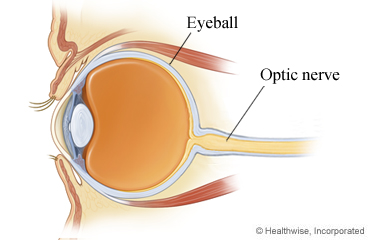Learning About Pseudotumour Cerebri

What is pseudotumour cerebri?
Pseudotumour cerebri (say "soo-doh-TOO-mer SAIR-uh-bry") is an increase in pressure of the fluid that surrounds the brain. Your doctor may also call the condition "idiopathic intracranial hypertension." Normally, this clear fluid acts like a buffer to protect the brain. It is called cerebrospinal fluid, or CSF. It's not clear what makes the CSF pressure rise. Some medicines may cause it. Sleep apnea, obesity, and anemia may also play a part.
The pressure may build over time. The rising pressure can make the optic nerve swell. The optic nerve is at the back of the eye. It carries visual information from the eye to the brain. The swelling may damage the nerve and lead to permanent loss of some or all of the eyesight.
There are several symptoms of rising CSF pressure. Some symptoms may be present all the time. Some might come and go. Symptoms include:
- Severe headaches. They sometimes come with nausea and vomiting. The pain may be centred behind the eyes.
- A hissing or roaring sound in the ears that keeps time with your heartbeat.
- Problems with vision. You may not be able to see well at the edge of your field of view. You may also lose centre vision. It may happen now and then, in one or both eyes, and last for a few seconds at a time.
The word "pseudotumour" may sound scary. But it's not a brain tumour. The condition gets its name because the pressure inside the skull can mimic what happens when a person has a tumour.
How is it treated?
- If you are taking medicines that could be raising your CSF pressure, your doctor may change your medicines.
- You may get medicines to help your body make less CSF. This can help lower the pressure around the brain.
- Your doctor may also give you medicine for headaches.
- If sleep apnea, obesity, or anemia may be causing the CSF pressure to rise, your doctor may treat those problems.
- If your vision is getting worse, you may have surgery to make a small opening on the optic nerve to reduce swelling.
- Your doctor may implant small tubes inside the skull to drain the extra fluid. This helps lower the pressure around the brain.
Follow-up care is a key part of your treatment and safety. Be sure to make and go to all appointments, and call your doctor or nurse advice line (811 in most provinces and territories) if you are having problems. It's also a good idea to know your test results and keep a list of the medicines you take.
Current as of: December 3, 2024
